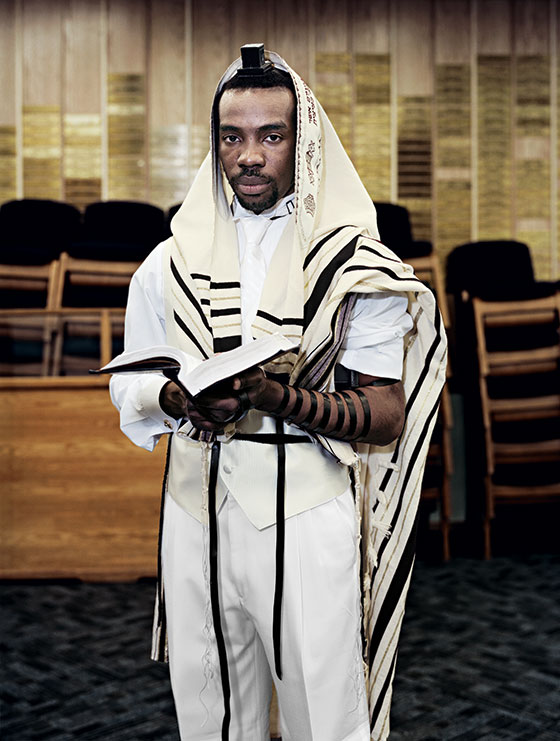
Photographs by Wayne Lawrence
Text by Molly Langmuir
The ad, plastered in the subway in the sixties, showed an African-American boy eating a rye sandwich: YOU DON’T HAVE TO BE JEWISH TO LOVE LEVY’S. If you were black, in other words, you weren’t Jewish. And to be black and Orthodox—that would mean encountering disbelief at your very existence.
Estimates for the number of black Jews in the U.S. vary wildly, from 20,000 to more than 150,000, with some experts saying the population is too small to accurately measure. But MaNishtana Rison, who has become a prominent voice for Jews of color thanks to his advocacy work and dating website, estimates there are probably only 50 or 60 blacks among the roughly 500,000 Orthodox in Greater New York. “For the most part, we know each other,” Rison says. “It’s what we call Jewish geography—even if we’ve never met, we at least know someone in common.”
Wayne Lawrence became interested in photographing black Jews after he moved to Crown Heights, where memories still linger of the 1991 riots, and noticed a few black Orthodox living up the street. “It’s not that they identify as black Jews, but the fact that they identify as Orthodox,” he says. “What was surprising to me is that they’d want to be a part of something that didn’t necessarily want them there.”
The men and women he photographed included converts and some born into the faith, some of them Lubavitchers, some who call themselves Hasidic, and others who simply say Orthodox or “observant.” “You have to admire their courage,” he says. “They’re just trying to carve out their own space.”
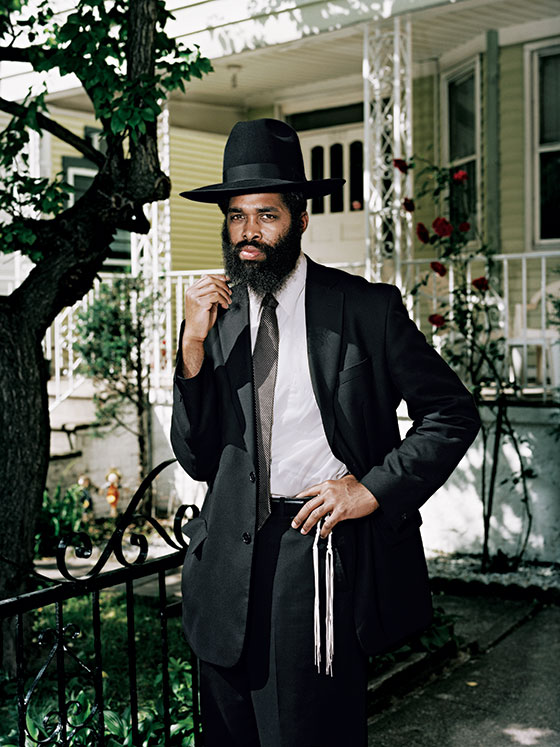
Nechemyah Davis
Twenty years ago, the hotbed of Brooklyn racism was Crown Heights. I tell my friends to try to educate their children so they know G-d created all kinds of people. My hope is that by talking about it, eventually a person who looks across the subway platform and sees a black guy in a hat with peyas will think, Maybe he’s not Amish. But we’ll never stop being black. It’s who we are. It can get tiring, but being black and Jewish for us is the ultimate test of how to be righteous. It’s a jungle out there.
Because I converted, my experiences can really set me apart. I was at a friend’s house and happened to mention a bikini, and one of the girls there didn’t know what that was. Part of me was thinking, That’s beautiful, she’s so modest. But the other part was thinking, How blind can you be?
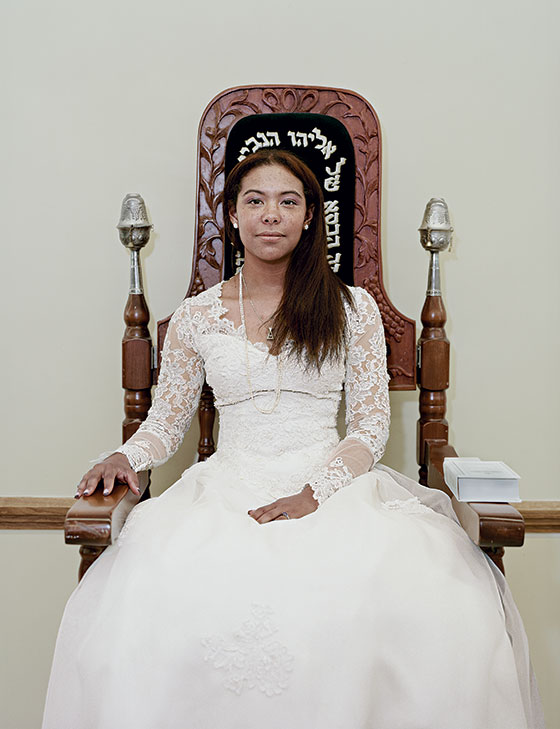
Gulienne Rollins-Rison & Manishtana Rison (pictured on page one)
Gulienne: For a while, I thought of myself as ethnically Jewish. I’m biracial, and in middle school people started to ask: “What are you?”
Manishtana: I always knew the person I’d marry would be black and Jewish. My friends would always tease me about how I was holding out for this mythical black Jewish woman.
Gulienne: As a Jew of color, you’re this mythical creature that supposedly doesn’t exist. He’s been writing a book about his life that’s going to be called Thoughts From a Unicorn.
Manishtana: For better or for worse, I never clicked with the Jewish community. I’ve always felt more at home in the African-American or Caribbean community. I went to synagogue for fifteen years with the same kids, but on the street they’d walk past me. For Jews, there’s this sense that we’re the chosen people, so we think we’re better than you. But when a person’s faced with someone they assume is of a lower rung and then they realize that person is also Jewish, it means they’re also chosen. I think that can be really unsettling. I’ve known a couple of Jews of color who’ve converted, who told me the rabbi said they would no longer need to worry about being black because now they’re Jewish.
Gulienne: I grew up pretty entitled to my Judaism—everyone knew my family or me. In college sometimes it was different—I’d go into Judaica shops, and the person working there would be like, “Oh, do you know how to use that?”
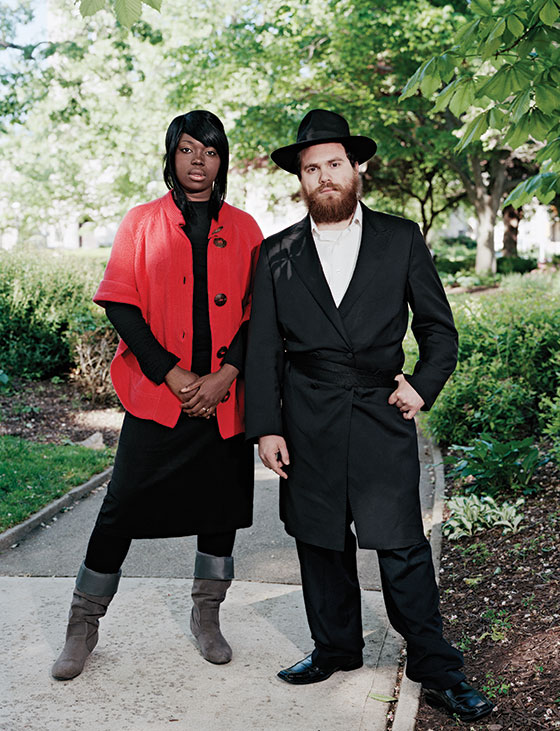
Zehava Bracha Arky & Baruch Arky
Zehava: I obviously look different from a lot of people in our community. Before I got married, when people would try to set me up, they would often set me up with another Jew of color, without considering if we might have anything else in common.
Baruch: I don’t think that people relate to us as an interracial couple. We’re both Jewish, and that seems to speak louder than color.
Zehava: My father was raised Muslim, and my mother was raised Christian. A friend suggested I go to Chabad, so I went for Shabbes dinner and then to shul. I didn’t know exactly what was going on, but it was so interesting and deep. I realized that all the spiritual ideas I already had, which I had thought were just my own, were also a part of Judaism.
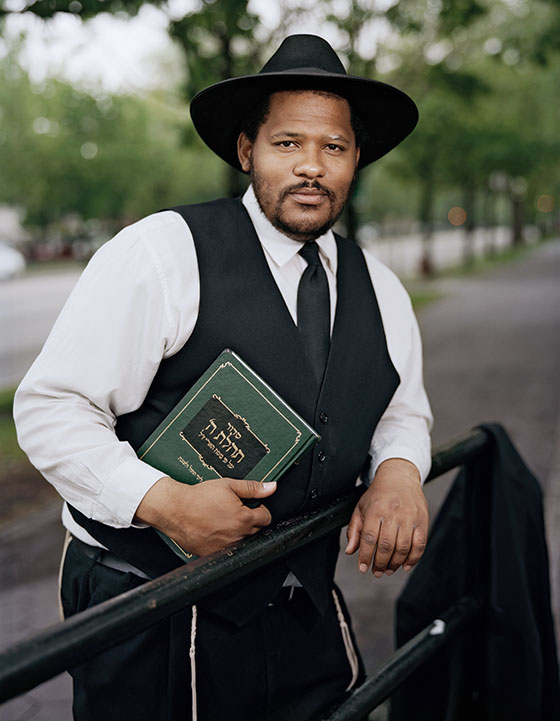
Joseph David Savoy
I come from a very dysfunctional family. My dad killed his stepfather and then served four years in prison. I was born in controversy—like in the Bible when Jacob married two sisters, my dad impregnated two sisters. People feel it’s extreme to be Hasidic, but I just think, Are you kidding me? Considering what I was born into, it’s pretty normal. It gives me structure and focus and order. I feel at peace finally after all these years.
I moved to New York in 2007, and in Crown Heights the Jewish community has been wonderful. But from African-Americans, every day I get looks and stares. I’ve had people yell “Heil Hitler.” One guy threatened to stab me. If there are people behind me and I turn around, they’ll literally jump like they’ve seen a ghost.